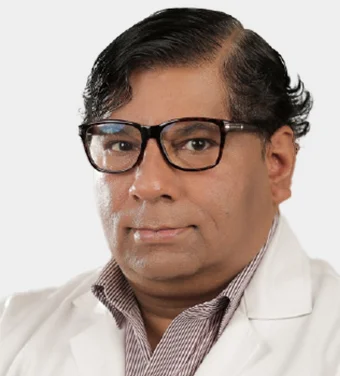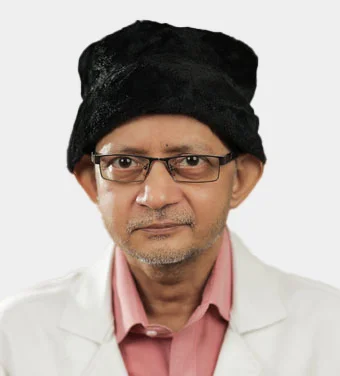
Welcome to IBS Hospital’s distinguished Dementia Care Program. Our seasoned team of specialists is committed to guiding and supporting you and your loved ones through the complexities of dementia. With a personalized approach, advanced treatments, and unwavering empathy, we aim to improve quality of life, promote mental well-being, and provide a reassuring sanctuary for those affected by dementia.
What is Dementia?
At IBS Hospital, we recognize dementia as a progressive condition leading to gradual cognitive decline, impacting daily life, emotions, and personality. Millions worldwide are affected, with higher incidence among those aged 85 and above. Our dedicated team offers comprehensive care and support for individuals and families dealing with dementia.
What are the different types of Dementia?
Dementia encompasses various types, each with distinct characteristics and underlying causes.
Dementia is broadly classified into the following different types:
- Alzheimers Disease: The most prevalent form, characterized by memory loss and cognitive decline.
- Vascular Dementia: Caused by reduced blood flow to the brain, leading to impairments in thinking and reasoning.
- Lewy Body Dementia: Involves the accumulation of abnormal protein deposits in the brain, resulting in cognitive fluctuations, visual hallucinations, and motor issues.
- Frontotemporal Dementia (FTD): Affecting the frontal and temporal lobes of the brain, causing changes in behaviour;personality, and language difficulties.
- Mixed Dementia: A combination of two or more types, often Alzheimer’s disease and vascular dementia.
- Creutzfeldt-Jakob Disease (CJD): A rare, rapidly progressive dementia caused by prion protein abnormalities.
- Parkinson’s Disease Dementia: Develops in individuals with Parkinson’s disease, leading to cognitive decline over time.
- Huntington’s Disease: A genetic disorder causing progressive cognitive, motor, and psychiatric symptoms.
Understanding the specific type of dementia is crucial for appropriate diagnosis and management, as each type may present unique challenges and require tailored care approaches
Recognising the Symptoms of Dementia
Dementia symptoms vary among patients and progress with the disease. Symptoms include:
- Memory problems and forgetfulness
- Poor judgment and confusion
- Difficulty understanding and expressing thoughts
- Reading/writing challenges
- Repetitive speech or actions
- Slower completion of daily tasks• Hallucinations and delusions
- Impulsive or paranoid behaviour
What causes Dementia?
Dementia results from Brain abnormalities caused by neuron damage or disrupted signals. Its impact varies based on the affected brain area. Factors contributing to dementia include:
- Brain injury
- Advancing age
- Family history of dementia
- Down syndrome
- Cardiovascular risk factors
- Sleep apnea
- Nutritional deficiencies
- Alcohol and drug abuse
- Unhealthy diet and sedentary lifestyle
Diagnosis of Dementia
Diagnosing dementia is complex, and no single test is definitive. Doctors employ various assessments, including:
- Cognitive and neurophysiological tests to evaluate memory, reasoning, language, attention, and more.
- Brain imaging scans (CT, MRI, PET) to detect brain abnormalities.
- Laboratory tests to check for deficiencies or underlying conditions.
- Cerebrospinal fluid tests for abnormal substances linked to dementia.
- Psychiatric evaluation to assess mental health and related symptoms.
Management / Treatment of Dementia at IBS Hospital
At IBS Hospital, we understand that there is currently no cure for dementia. Our treatment approach focuses on slowing down its progression and enhancing mental functions. Our common treatment modalities include:
- Medications like Cholinesterase inhibitors and Memantine to improve memory, judgement, learning, and memory retention. We also address symptoms like depression, hallucinations, and sleep issues.
- Comprehensive therapeutic programs, including occupational therapies, behavioural management, environmental modification, and task simplification, tailored to individual patient needs.
Our team of experts that make it possible
Meet the team of highly specialised and experienced neurosurgeons, neurologists, orthopedicians, and other experts in the field of neurology and spine care. Our team is dedicated to providing personalised and compassionate care to each patient, with the goal of helping them achieve the best possible outcomes.
IBS Hospital Empowers Your Treatment with Cutting-edge Technology
We continuously incorporate cutting-edge technologies from around the world into our offerings, such as a surgical system that allows for precise and confident complex procedures. We use magnetic stimulation to treat certain neurological conditions and create personalised brain maps for tailored treatment plans. Nerve monitoring during surgeries ensures the nervous system is not compromised, and a robotic exoskeleton aids in mobility issues. Our goal at IBS Hospital is to provide the best care possible, utilising the latest and most innovative technologies available.








